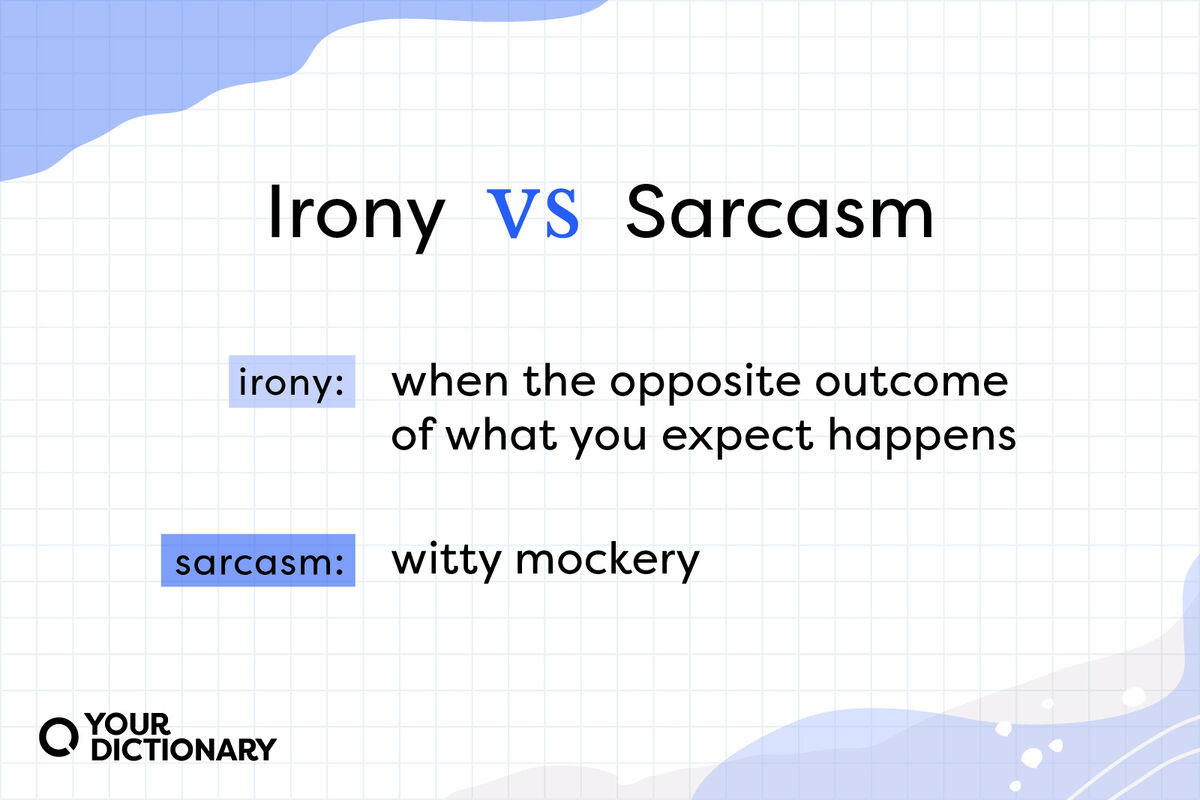
When it comes to irony vs. sarcasm, it’s hard to see the difference between these two terms. However, irony is the opposite of what you would expect. Sarcasm, on the other hand, has a condescending tone meant to embarrass or insult someone. Therefore, the negativity in sarcasm is the clear difference. But, it’s not the only one. Break down irony vs. sarcasm to see the differences between them.
What Is Irony?
To remember irony, think opposite. The reason why is due to the definition of irony, which is when the opposite outcome of what you expect happens. It sounds a bit confusing, but irony is quite easy to understand. For example, a stylist is teaching a course on safe clipper usage and accidentally shaves a person bald right down the center of their head. It’s ironic because it's the opposite of what you would expect to happen in a clipper safety course.
Types of Irony
When it comes to irony, there are a few different types you’ll find in life and literature. Knowing the difference between each one is important to understanding irony vs. sarcasm.
- Situational irony is a situation with the opposite outcome of what you’d expect. For example, in The Wizard of Oz, Dorothy journeys to the wizard only to find out she was the only one who could send herself home.
- Verbal irony is all about saying the opposite of what you mean. For example, saying ‘The weather is great’ during a tornado.
- Dramatic irony is where the audience knows something the characters don’t. It works to create tension and humor because the opposite of what they expect happens. For example, in Snow White and the Seven Dwarves, we know the old woman is the wicked queen, but Snow White doesn’t.
Irony Examples
Need a few more ironic examples to drive this point home? Dive into these fun and creative examples of irony.
- Fire chief's house burning down (situational irony)
- Saying, ‘it’s a great time to go for a swim,’ during the winter (verbal irony)
- A hero shares his undying love for a heroine in a note that falls under a desk. The hero just assumes the heroine doesn’t return his feelings. (dramatic irony)
- A hair stylist having a bad haircut (situational irony)
- Friends buying skydiving lessons for someone afraid of heights. They say, ‘Oh, I can’t wait.’ (verbal irony)
- Skydiving instructor who's afraid of heights (situational irony)
What Is Sarcasm?
Verbal irony seems a lot like sarcasm, doesn’t it? However, verbal irony and sarcasm have one distinct difference, which is negativity. Sarcasm is typically witty mockery. Therefore, it has a negative connotation, whereas verbal irony doesn’t.
It can be helpful to look at the two side-by-side to see the difference.
- Verbal Irony - Mother saying, ‘I quite enjoy muddy paw prints on my new white carpet.’
- Sarcasm - Mother-in-law saying to that same mother, ‘White was a fabulous choice for your new carpet. It goes great with 2 kids and 3 dogs.’
See how with verbal irony, it’s ironic because muddy paw prints are never enjoyed on white carpet. Instead the opposite is true, they are frustrating and a mess.
However, sarcasm is making a cutting or sneering remark about buying white carpet with children and pets. Looking at the two next to each other, it can be easier to see how they are different.
Sarcasm Examples
With a clear understanding of sarcasm, it’s time to check out some fun examples.
- Dinner rehearsal: Yes, because we can’t practice eating enough, can we?
- Someone makes an obvious remark: Really, I never knew you were that clever!
- Boy with too much body spray: That’s a lovely scent, did you bathe in it?
- After making a mistake: You did a brilliant job.
- Self-deprecating: I bought a boat right before deciding to move to Nevada. I’m a genius.
Irony vs. Sarcasm
Sometimes the difference between irony and sarcasm can be hard to see. However, once you start to break down definitions, it’s clear to see that sarcasm is like irony with attitude. Sarcasm doesn’t have any other purpose but to insult or embarrass, even yourself.
Since you know a bit about sarcasm and irony, it’s important to explore sarcasm vs. irony vs. satire. Satire used irony, sarcasm, and ridicule to show the ridiculousness of some human traits or organizations. Satire examples will show you it’s many faces.